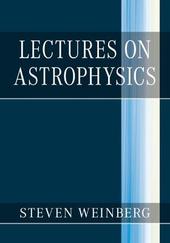
|
Lectures on Astrophysics
Hardback
Main Details
| Title |
Lectures on Astrophysics
|
| Authors and Contributors |
By (author) Steven Weinberg
|
| Physical Properties |
| Format:Hardback | | Pages:226 | | Dimensions(mm): Height 258,Width 182 |
|
| Category/Genre | Cosmology and the universe
Relativity physics |
|---|
| ISBN/Barcode |
9781108415071
|
| Classifications | Dewey:523.01 |
|---|
| Audience | | Professional & Vocational | |
|---|
| Illustrations |
Worked examples or Exercises
|
|
Publishing Details |
| Publisher |
Cambridge University Press
|
| Imprint |
Cambridge University Press
|
| Publication Date |
12 December 2019 |
| Publication Country |
United Kingdom
|
Description
Lectures on Astrophysics provides an account of classic and contemporary aspects of astrophysics, with an emphasis on analytic calculations and physical understanding. It introduces fundamental topics in astrophysics, including the properties of single and binary stars, the phenomena associated with interstellar matter, and the structure of galaxies. Nobel Laureate Steven Weinberg combines exceptional physical insight with his gift for clear exposition to cover exciting recent developments and new results. Emphasizing theoretical results, and explaining their derivation and application, this book provides an invaluable resource for physics and astronomy students and researchers.
Author Biography
Steven Weinberg is a Professor of Physics and Astronomy at the University of Texas, Austin. His research has covered a broad range of topics in quantum field theory, elementary particle physics, and cosmology, and he has been honored with numerous awards, including the Nobel Prize in Physics, the National Medal of Science, and the Heinemann Prize in Mathematical Physics. The American Philosophical Society awarded him the Benjamin Franklin medal, with a citation that said he is 'considered by many to be the preeminent theoretical physicist alive in the world today'. He is a member of several academies in the USA and abroad, including the US National Academy of Sciences and Britain's Royal Society. He has written several highly regarded books, including Gravitation and Cosmology (1972), a three-volume work The Quantum Theory of Fields (Cambridge, 2005), Cosmology (2008), and Lectures on Quantum Mechanics (Cambridge, 2nd edition, 2015).
Reviews'This book is entitled 'Lectures on Astrophysics' and indeed is based on notes for courses on astrophysics delivered in recent years. Thus the material is road-tested and, as is necessary in any lecture course, compromises have been made on the scope of the work in order to make the treatment digestible.' K. Alan Shore, Contemporary Physics 'I would have to say that the stronger you are at mathematics, the more you will get out of the book. But even if you feel that you are not heavily mathematically inclined, the explanatory texts in the equation-free paragraphs are a model of clarity. The book is strong on modern topics, so, if you haven't updated your astrophysics teaching notes for a long time, and you wish to update them with modern topics, this is just the very book you need.' Jeremy Tatum, The Observatory 'Steven Weinberg has written a self-contained and relatively short account of the foundations of astrophysics, from stars to galaxies. The result is extremely pleasant and particularly suitable for students and young practitioners in the field ... Weinberg's books always stimulate a wealth of considerations on the mutual interplay of particle physics, astrophysics and cosmology, and the problems of dark matter, dark energy, gravitational waves and neutrino masses are today so interlocked that it is quite difficult to say where particle physics stops and astrophysics takes over. If we want to understand the developments of fundamental physics in coming years, Lectures on Astrophysics will be an inspiring source of reflections and a valid reference.' Massimo Giovannini, CERN Courier '... based on lectures delivered in 2016 and 2017. In a text that is clear and concise, and supported by analytical equations that do not require a computer to solve, Weinberg frequently offers the reader insight into the essential physical concepts by doing approximate calculations. He also provides twelve problems for the reader to attempt to solve, ... The book is strongly recommended to libraries supporting readers at the graduate and advanced undergraduate level.' T. Barker, Choice
|